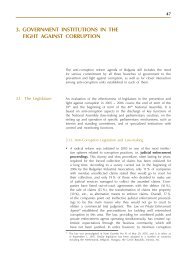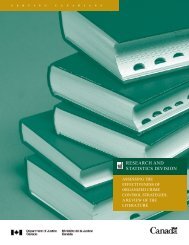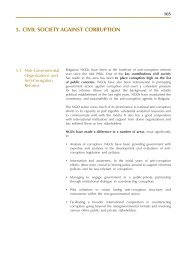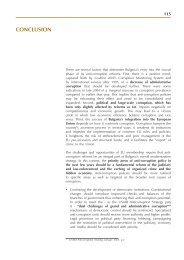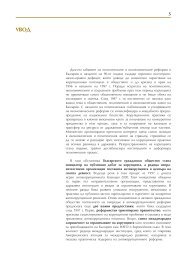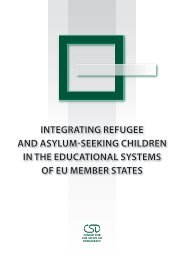National Threat Assessment 2008. Organised Crime - Politie
National Threat Assessment 2008. Organised Crime - Politie
National Threat Assessment 2008. Organised Crime - Politie
Create successful ePaper yourself
Turn your PDF publications into a flip-book with our unique Google optimized e-Paper software.
immediately. There may be a question of investing in the relationship, whereby<br />
the underlying idea is that something will be required in return at some point in<br />
the future. Such a consideration is difficult to prove because the people involved<br />
remain silent and no administrative traces of the transaction were left, for<br />
example. A large number of the investigations concerning corruption (Section<br />
363 of the Penal Code) end up as ‘breach of official secrecy’ (Section 272 of the<br />
Penal Code). Various respondents stated that this is based on deliberately chosen<br />
tactics: priority is assigned to removing the bad apple from the bunch. As a<br />
result, actually proving and punishing corruption has to take second place.<br />
Customs and the Royal Netherlands Marechaussee<br />
The crossing of national borders is monitored by Customs and the Royal<br />
Netherlands Marechaussee (KMar). Employees of these supervisory organisations<br />
sometimes aid and abet criminal organisations in return for payment. These<br />
employees end up doing so for the same reasons as some police officers help<br />
criminal organisations; in that respect their position is not different.<br />
The main logistics hubs are Schiphol Airport and the port of Rotterdam. Various<br />
leading publications have concluded that corruption of public servants hardly<br />
occurs in ports 62 . The indications are different with regard to Schiphol. KMar and<br />
Customs employees are quite regularly arrested for aiding and abetting various<br />
forms of organised crime. This mainly involves human trafficking, smuggling<br />
of illegal immigrants and drug smuggling.<br />
According to the respondents, Schiphol Airport provides a lot of opportunities<br />
for corruption of public servants. The impression is that these are mainly ‘minor’<br />
contacts, who allow something through or provide information about a<br />
particular flight, for example. One KMar respondent expressed doubts about<br />
whether corruption occurs on a large scale. According to one Customs<br />
respondent, there are only a few cases per year among Customs officials.<br />
Nevertheless, there have also been larger cases recently in which supervisory<br />
officials were involved.<br />
One notable aspect of the corruption of public servants is that most cases<br />
involve officials in the field and not managerial officials who occupy strategic<br />
positions. This is because of the transit nature of crime in the Netherlands. Help<br />
from public servants and from supervisory officials in the field is often sufficient<br />
for transit activities. It is not necessary to develop positions of power. Criminal<br />
organisations prefer not to run more risks than necessary.<br />
62<br />
However, corruption does occur among the employees of businesses in the ports,<br />
but that subject will be discussed in the following subsection (5.2.3).<br />
chapter 5 – Criminal modus operandi<br />
181



